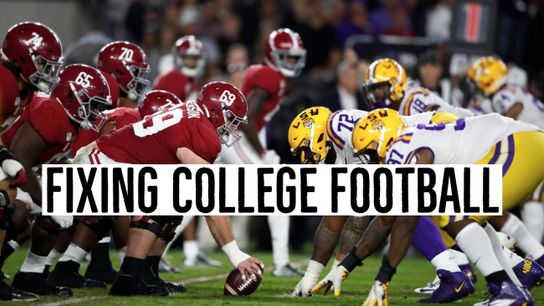We've all got nothing but time on our hands these days, and this (forced) downtime gives us all an opportunity to pause and reflect. Coaches across the country take time that would have otherwise been spent analyzing spring practice film to do some self-scouting or deep dives into schematic ideas they wouldn't otherwise have the time to study. Likewise, I, too, am going back to the drawing board. This is the first in an occasional series where we imagine ways to improve upon God's favorite sport.
The views expressed here are mine and do not reflect those of my employer's.
In the weeks before the 2019 season, the NCAA tweaked its overtime rules. No longer would teams trade possessions from the 25-yard line until the sun comes up; beginning in the fifth extra frame, teams will fast forward straight to alternating 2-point conversions until one team succeeds and another fails.
The change was a response to the previous fall's LSU-Texas A&M marathon. Tied for the longest game in college football history, A&M's 74-72 win over LSU topped the previous four septuple overtimers in points (146) and clocked in just shy of five hours (4:53).
This, to me, missed the point. At seven overtimes, at four overtimes, the point is obvious: the two teams have battled to the best of their abilities for the allotted time and then some, and neither was better than the other. They played, and the results proved them equals on that day. No matter how you tweak the rules, it obscures the point that the game has already rendered a verdict, and that is one of a split decision.
College football is a sport that constantly reinforces a single mantra to its inhabitants: earn everything. Nowhere in America will you talk into a weight room and see the phrase "Obtain success by default" plastered on the walls. No, every scrap of food has to be earned.
So why, then, is the single greatest reward the game has to offer -- the win -- handed out by default.
Now, I know you're probably rolling your eyes at me. Make no mistake, I realize I'm firmly in the minority here. People hated ties, stretching all the way back to the 19th century.
But that, I believe, is because we fundamentally misunderstood what a tie represented. People viewed ties as the absence of a verdict, the game's version of a mistrial. This is not the case. A tie is a verdict in and of itself: that neither team was better than the other on this day. Bastardizing the game -- say what you will about the NFL's overtime system, but at least it doesn't render the punt obsolete -- in order to force a result other than one the game already produced is another example of man playing god.
God designed football games to be played in 60-minute increments, and Man, in our infinite hubris, pushed it beyond anything the Creator extended.
There is a presumption that reinstating the tie would lead to an increase in dull, anticlimactic football, and I respectfully disagree.
First of all, only a small percentage of games end with an equal score after regulation. This study counted 156 overtime games between 2008 and Oct. 2013, an average of 26 per season, spread across 120-odd teams.
But this assumes that coaches would handle end-of-clock situations the same without the crutch of overtime, and this would not be the case.
Just as a person's true nature is revealed in times of adversity, so is a coach's true character laid bare when his team scores a touchdown to pull within 28-27 with 1:30 to play.
Of course, championship games can not end in a tie. There, a winner has to be determined, either naturally or by default. We have to have some time of overtime in place, and we'll get to that next time.
